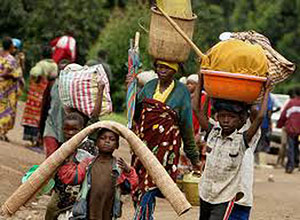After the Tutsi genocide in Rwanda in 1994 and given the systemic nature of conflict, the effects spread over the whole region, causing a lot of suffering mainly in DRC. It is however important to note that Rwanda has since single handedly managed to quickly recuperate from these effects by ending the insurgence that raged in the North of the country in the late 1990s, neutralizing the genocidaire armed group in DRC from around 150,000 Ex-FAR and Interahamwe militias to around 6000 today.


After the Tutsi genocide in Rwanda in 1994 and given the systemic nature of conflict, the effects spread over the whole region, causing a lot of suffering mainly in DRC.
It is however important to note that Rwanda has since single handedly managed to quickly recuperate from these effects by ending the insurgence that raged in the North of the country in the late 1990s, neutralizing the genocidaire armed group in DRC from around 150,000 Ex-FAR and Interahamwe militias to around 6000 today.
The government of Rwanda established a Unity and Reconciliation Commission, a national human rights commission, Gacaca Courts, repatriation and reintegration center at Mutobo for the Rwandan armed groups wishing to repatriate and other institutions aimed at creating positive peace.
The success has been gigantic and this is an inspiration to the region and the entire world and this partly why foes of yesterday are becoming friends and brothers of today. They see Rwanda as a model and a serious partner to work with to achieve peace in this region.
In the DRC mapping report, it is alleged that Rwanda Hutu men were separated from others and killed, Ms. Fabienne is adding her own dimension by saying that women and children were lured into repatriation camps only to be executed.
The DRC mapping report is being manipulated by Rwanda’s adversaries for political reasons so that it has resemblance of the 1994 tutsi genocide in Rwanda. This is all intended to qualify the "double genocide” theory as claimed by Rusesabagina, Victoire Ingabire and others that share the same agenda.
The DRC mapping report cannot be accepted because the team that compiled the report did not have the mandate of qualifying crimes, the methodology used by the team was flawed and the report is full of eras and baseless allegations.
Ms. Fabienne Hara made a conclusion that crimes were committed, even when the team responsible for DRC mapping report expressed doubt of their own report. It is mentioned in Fabienne Hara’s article that the " Security Council to extend the mandate of the International Criminal Tribunal for Rwanda, giving it a regional jurisdiction, for instance on foreign nationals for crimes committed in the DCR and extending its temporal reach beyond 1994 and at least until 2002 when the ICC was created”.
Such a recommendation is a wishful thinking from a biased mind intended to negatively influence international community. What she needs to be reminded is that ICTR was established after the crimes of genocide, war crimes and crimes against humanity had been proved beyond reasonable doubt that they were committed in Rwanda by competent organizations such as: UN Security Council, OAU, Independent researchers, Human rights organizations.
Such irresponsible and malicious comments should not be accepted. Look also at what ICTR has achieved in terms of cases tried given its mandate and its huge budget.
The author further makes another wild recommendation, "what the people of Congo really need is a genuine commitment from regional leaders and countries such as the US, UK, France and China to following up the report with action to combat impunity and foster fresh dialogue between the DRC and Rwanda, in particular, to negotiate contentious issues such as state reform, wealth sharing, citizenship and land issues” Such recommendation is diversionary and misleading the international community.
How can Rwanda get involved in the internal issues of DRC? Rwanda and DRC border is well demarcated and therefore the land issue is not a problem to the two countries. Rwanda has its own wealth and so is DRC.
The recommendation by the author is basically a DRC internal issue and Rwanda should not be dragged into internal politics of DRC.
The author also criticizes the joint operations against FDLR in 2009 (Umoja wetu) and later on ( Kimia 1 and 11).
First of all the armies of the two countries at first were adversaries, it is something laudable that the two armies were able to come together for a joint operation. This was the first step on confidence building measures between the two countries. Rwanda was in DRC for only one month but they managed to disorganize the FDLR operational capability, repatriated thousands of refugees. If the operation had been supported by international community and extended for few more months, FDLR would be no more.
What is the value added by MONUC since it deployed in DRC, apart from raping DRC women, exploiting DRC minerals and arms trafficking to FDLR.
Since international community including UN has shown no interest to make a positive contribution towards eradicating the FDLR menace in Eastern DRC, bilateral initiatives between DRC and Rwanda is the only way to go and so far positive progress has been registered. There is need to stop sponsoring political reports that sabotage the ongoing diplomatic contacts that have been established.
Having highlighted the achievements registered by DRC and Rwanda in the area of cooperation which has led to improved security situation in most parts of the two countries, Ms. Fabienne Hara’s suggestions to the UN Security Council is rather unnecessary because it is taking us backward instead of forward.
Hara’s proposal should thus be ignored and instead DRC and Rwanda should be supported by international community in their efforts to stabilize the region.
The onus is on the UN, international community and regional players to support the positive change that the two countries have initiated.
Ends


